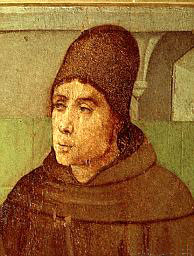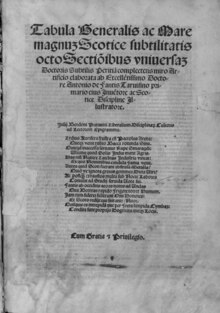Scotism
Philosophy Portal Scotism is the philosophical school and theological system named after John Duns Scotus, a 13th-century Scottish philosopher-theologian.
The word comes from the name of its originator, whose Opus Oxoniense was one of the most important documents in medieval philosophy and Roman Catholic theology, defining what would later be declared the dogma of the Immaculate Conception by Pope Pius IX in his constitution Ineffabilis Deus on 8 December 1854.
The difference between Thomism and Scotism could be expressed by saying that, while both derive from Arabic Neoplatonized Aristotelianism, Thomism is closer to the orthodox Aristotelianism of Maimonides, Averroes and Avicenna, while Scotism reflects the Platonizing tendency going back through Avicebron, the Brethren of Purity, the Liber de Causis and Proclus to Plotinus.
While Thomism has received unparalleled backing by the Magisterium,[3] Scotist influence prevailed on a number of important points, not least the doctrine of the Immaculate Conception.
The Council of Trent defined as dogma a series of doctrines especially emphasized by the Scotists (e.g. freedom of the will, free co-operation with grace, etc..).
A comparison of the Scotist teaching with that of Aquinas has been often attempted – for example, in the abovementioned work of Hauzeur at the end of the first volume; by Sarnano (Costanzo Torri, Conciliatio omnium controversiarum etc.
Of the Minorites who supported Scotist doctrine, the Conventuals seem to have adhered most faithfully to Scotus, particularly at the University of Padua, where many highly esteemed teachers lectured.
Special Scotist chairs appear during the sixteenth and seventeenth centuries, in locations including Paris, Rome, Coimbra, Salamanca, Alcalá, Padua, and Pavia.
Notable Scotists of the fourteenth century included Antonius Andrea and Francis of Mayrone (c. 1280–1328) author of a Tractatus de transcendentibus.
Scotists of the fifteenth century included two popes, Alexander V and Sixtus IV, Elector Frederick III of Saxony and Angelus of Chivasso.
Notable Scotists of the sixteenth century included Paul Scriptoris, noted professor at the University of Tübingen, and the Archbishop of Athens Antonio Trombetta.



